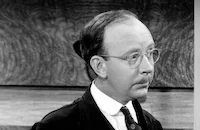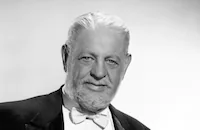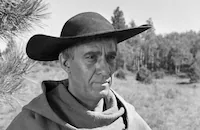Up in Central Park
Cast & Crew
William A. Seiter
Deanna Durbin
Dick Haymes
Vincent Price
Albert Sharpe
Tom Powers
Film Details
Technical Specs

Synopsis
In the 1870s, as election time rolls around in New York City, the political organization Tammany Hall, led by its corrupt political boss, William Tweed, is once again working hard to re-elect its candidates, including the mayor, Joe Oakley, in order to continue its raids upon the coffers of the city and state. The lone voice against Tweed's organization is John Matthews, a young, naïve reporter for the New York Times . Meanwhile, Irish immigrants Timothy Moore and his singing daughter Rosie arrive in New York with stars in their eyes, only to be set upon immediately by Rogan, one of Tweed's men. After the illiterate Timothy votes twenty-three times for the Tammany ticket, he is rewarded with $50 and an invitation to Tweed's victory party. There, Rosie wanders upstairs, where she inadvertently overhears Tweed's latest plan to embezzle the city's monies through the unnecessary renovation of Central Park. Fearful that Rosie may know about his plan, Tweed appoints the guileless Timothy to the post of Park Superintendent. Later, John meets Timothy, and the new city official, not knowing that John is a reporter, tells him that some of the park's zoo animals are actually being raised for Tweed's consumption. After the story appears in the paper, Timothy is fired, but when Rosie asks the infatuated Tweed to give her father another chance, he agrees. John is also enraptured with Rosie, so he, in turn, offers Timothy a job with his paper. Once alone, John tries to convince Rosie of Tweed's dishonesty, but has little success. Rosie almost becomes aware of Tweed's true character later that night, however, when he makes numerous, lecherous advances toward her during dinner, but is interrupted by Timothy, who mistakenly believes that he was invited for supper as well. Rosie then arranges a meeting between John and Tweed. When the political boss offers to sponsor John's proposed novel if he agrees to quit his position at the New York Times , John refuses the bribe. Later, John discovers Timothy attending grammar school classes, and with the help of Miss Murch, a schoolteacher, the old man learns of Tweed's corruption. Timothy tries to tell Rosie about Tweed, but she refuses to listen, having become romantically involved with him even though he is married. With Tweed's help, Rosie auditions for an opera company, and though she is offered a role in an upcoming production, Tweed insists that she be cast in the current show. An upset Timothy then offers to help John gain evidence against Tweed by breaking into city hall and examining the city's financial records. They are caught when Oakley wanders into his office, but the drunken mayor is tricked into giving his copies of Tweed's financial dealings to the newspaperman. Their corruption exposed, Tweed and his associates quickly make plans to flee the country, but Tweed makes no apologizes to Rosie for his actions, stating his belief in the rights of the strong over the weak. After he leaves her, Rosie wanders through Central Park, where she is discovered by Timothy and John. She then asks her father's forgiveness and is reunited with John.

Director

William A. Seiter
Cast

Deanna Durbin

Dick Haymes

Vincent Price

Albert Sharpe

Tom Powers

Hobart Cavanaugh

Thurston Hall

Howard Freeman
Mary Field
Tom Pedi

Moroni Olsen
William Skipper
Nelle Fisher
Patricia Alphin
Nina Lunn
Bunny Waters
Wayne Tredway
Frank Mcfarland
Harry Denny
Hal Taggart
Ed Peil Sr.
Mike Lally

Curt Bois
G. Pat Collins
Brick Sullivan
J. G. Mcmahon
George Spaulding
Billy Newell

Martin Garralaga
Thomas Jackson
Tom P. Dillon
Harold Goodwin
Al Murphy
Richard Kipling
Paul Peter Szemere
Robert Verdaine
Rod De Medici
Alice Backes
Charles Miller
Tudor Owen
Clarence Straight
Bert Moorhouse
John Valentine
Erich Von Schilling
Billy Kimbley
Carol Dawn Pierson
Art Thompson
Stuart Holmes
William H. O'brien
Charles Meakin
Boyd Ackerman
Leslie Sketchley
Eddie Scarpa
Carl Sepulveda
Eva Pearson
David Newell
Crew
Howard Bay
Leslie I. Carey
Carmen Dirigo
Dorothy Fields
Russell A. Gausman
Mary Grant
Johnny Green
William Holland
David S. Horsley
Milton Krasner
Joe Lapis
Otto Ludwig
Ted Offenbecker
Francesco Maria Piave
Sigmund Romberg
Sigmund Romberg
Russell Schoengarth
Helen Tamiris
Karl Tunberg
Karl Tunberg
Giuseppe Verdi
Bud Westmore

Film Details
Technical Specs

Quotes
Trivia
Notes
According to Hollywood Reporter, Universal purchased the film rights to the Sigmund Romberg-Herbert Fields-Dorothy Fields musical in February 1946. The studio originally intended the production to be shot in Technicolor and produced by Felix Jackson. New York Times reported in October 1946 that actor-dancer Fred Astaire considered making his screen directorial debut with Up in Central Park; however, he had just opened a chain of dance schools at the same time which May have prevented him taking on this production. According to Hollywood Reporter news items, the film's production start date was delayed from December 1946 to July 1947 because of Technicolor difficulties. In September 1947, William Goetz, the production chief at Universal, told New York Times that the studio was filming Up in Central Park in black and white because of a "bottleneck" at the Technicolor laboratory, which would delay the release of the film by nearly one year. Later, in October 1947, another New York Times news item stated that Universal had chosen William Seiter as the film's director and planned to film Up in Central Park in black and white, rather than Technicolor, in order to keep production costs down. New York Times also noted that the musical number "The Birds and the Bees" from the original stage production would not be filmed, as it did not meet PCA code restrictions. According to Los Angeles Times, because of bad previews, Universal cut several musical numbers out of the picture, including the song "Close as Pages in a Book." Los Angeles Times estimated that the excised footage cost the studio over $200,000 to produce. Karl Tunberg's onscreen credit reads: "Produced and Written for the Screen by."
Up in Central Park is loosely based on events surrounding New York's Tammany Hall political scandal of 1871. William Marcy "Boss" Tweed, portrayed by actor Vincent Price in the film, was a corrupt political boss, who headed what would later be known as the "Tweed Ring." Tweed began his career in politics as a volunteer fireman, and was elected city alderman in 1850. While still an alderman, Tweed served in the U.S. Congress from 1853 to 1855, and began to take control of the political organization known as Tammany Hall. After losing his re-election bid as alderman in 1855, Tweed was elected to the city's Board of Supervisors in 1856. With the help of A. Oakley Hall, mayor of New York City, Richard B. Connolly, the city controller, and Peter Barr Sweeny, a city chamberlain, Tweed then gained control of the political graft system throughout New York. By 1868, Tweed had been elected to the state senate, as well as holding the posts of school commissioner, deputy commissioner of public works, and deputy street commissioner for New York City. For nearly twenty years, the city's coffers were systematically looted by the Tweed Ring through bribery, the padding of all city bills by eighty-five percent and phony check writing.
Tweed's undoing began in 1870, when political cartoonist Thomas Nast attacked him and his men in Harper's Weekly, and Samuel J. Tilden fought him for control of their political party. Tweed was then tried and convicted of larceny and forgery, but in December 1875, he escaped prison and fled the country. He was recognized in Spain on the basis of a Nast cartoon and returned to New York, where he died in prison on April 12, 1878. It is estimated that the Tweed Ring stole between 30 and 200 million dollars during its political reign.












